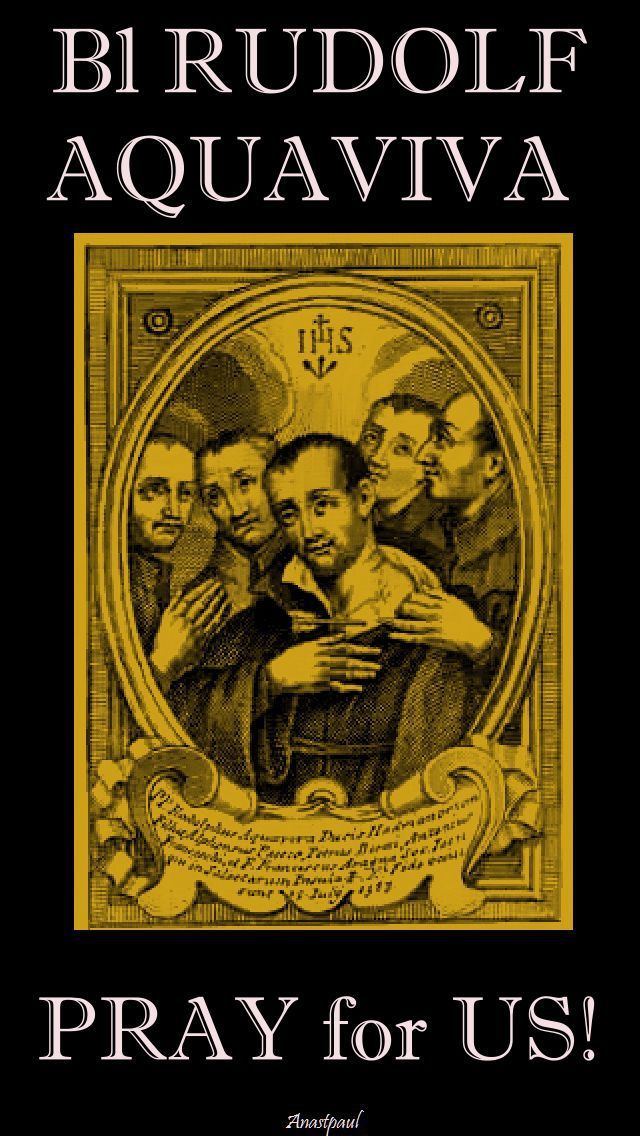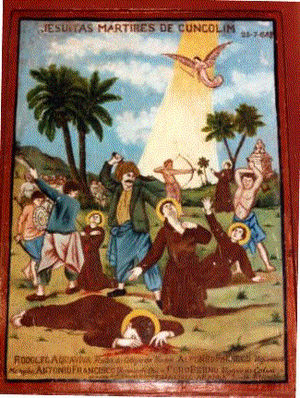July 25th: Blessed Rudolph Aquaviva, SJ
Born : Oct 25, 1550
Died : July 25, 1583
Beatified : April 2, 1893
 Rudolph Acquaviva, son of the duke of Atri, was born in the family castle in Italy’s Abruzzi region and his illustrious family was related to many of the noble houses of Italy. His uncle Claudio was the papal chamberlain in the court of Pope Pius V. As a boy Rudolph saw his mother visit hospitals and feed the poor and grew up following her example. He was generous in almsgiving, even to the point of giving away the clothes he was wearing. When his uncle relinquished his position to join the Society of Jesus, his father negotiated for the 17-year old Rudolph to take over the post. However instead of joining the papal court, Rudolph pleaded with his uncle to intercede with his father to grant him permission to become a Jesuit, as well. His father finally gave his consent when Rudolph convinced him that his decision was not a hasty one but one based on prayer and reflection.
Rudolph Acquaviva, son of the duke of Atri, was born in the family castle in Italy’s Abruzzi region and his illustrious family was related to many of the noble houses of Italy. His uncle Claudio was the papal chamberlain in the court of Pope Pius V. As a boy Rudolph saw his mother visit hospitals and feed the poor and grew up following her example. He was generous in almsgiving, even to the point of giving away the clothes he was wearing. When his uncle relinquished his position to join the Society of Jesus, his father negotiated for the 17-year old Rudolph to take over the post. However instead of joining the papal court, Rudolph pleaded with his uncle to intercede with his father to grant him permission to become a Jesuit, as well. His father finally gave his consent when Rudolph convinced him that his decision was not a hasty one but one based on prayer and reflection.
Rudolph entered the novitiate of Sant Andrea in 1568. He completed his philosophy and theology in Rome and was ordained in early 1578. He was accepted for the missions in India and set sail for Goa on March the same year. His first assignment in Goa was teaching philosophy to seminarians at St Paul’s College. A year later, he was sent as a missionary to the court of Akbar the Great Mogul who had an unquenchable thirst for knowledge and a desire to bring peace and harmony to both his Muslim and Hindu subjects who because of their religious beliefs were at odds with each other. Akbar held weekly religious discussions at his court near Agra and decided to include Christian theologians in these discussions. When he invited the Jesuits to his court to instruct him in the Christian faith, Fr Acquaviva and another Jesuit arrived at his court in 1580 with a seven-volume copy of the Bible with the hope of converting the grand mogul. Akbar was greatly interested in Christianity and seemed convinced of its truth but was not prepared to give up his harem. Fr Acquaviva returned to Goa after three years, disappointed that Akbar would never be converted.
Within days of his return to his Jesuit community, Fr Acquaviva was made superior of the mission in Salsette, a peninsula directly south of Goa where the inhabitants were mostly Hindus and fanatically anti-Christians. Salsette had become Portuguese territory in 1550 and although the first missionaries who had gone there in 1560, had very little success, the Salsette Hindus remembered the punitive Portuguese expeditions that destroyed their shrines and temples and hence became very hostile to all who attempted to abolish their religious practices.
 When Fr Acquaviva came to the mission in July 1583, the missionaries were planning to convert Salsette’s non-Christians and to visit all its sixty-six villages. They decided to start at the south most village of Cuncolim but were stopped from entering by a local leader because of internal problems. After waiting futilely for a few hours and hearing increasingly frightening shouts from the village, the Jesuits decided just to plant a cross on the site of a future chapel and to leave. Unknown to them, the spot chosen was the spot where a temple had stood until it was destroyed the year before. The people who had been secretly watching them summoned hundreds of angry villagers who surrounded the Jesuits. Just as a Hindu approached Fr Acquaviva, the missionary said, “With all my heart, I give my soul and body to God.” With a scimitar’s single slash, the attacker cut the back of the priest’s thighs and floored him. To show his readiness for martyrdom, Fr Acquaviva opened the collar of his cassock and exposed the left side of his neck. He was struck twice and the third blow hit his shoulder and his arm was nearly cut off. But it was an arrow in the breast that killed him. Fr Acquaviva’s last words were, “Forgive them, Lord. Francis Xavier, pray to God for me. Lord Jesus, receive my spirit.” He was just thirty-three years old.
When Fr Acquaviva came to the mission in July 1583, the missionaries were planning to convert Salsette’s non-Christians and to visit all its sixty-six villages. They decided to start at the south most village of Cuncolim but were stopped from entering by a local leader because of internal problems. After waiting futilely for a few hours and hearing increasingly frightening shouts from the village, the Jesuits decided just to plant a cross on the site of a future chapel and to leave. Unknown to them, the spot chosen was the spot where a temple had stood until it was destroyed the year before. The people who had been secretly watching them summoned hundreds of angry villagers who surrounded the Jesuits. Just as a Hindu approached Fr Acquaviva, the missionary said, “With all my heart, I give my soul and body to God.” With a scimitar’s single slash, the attacker cut the back of the priest’s thighs and floored him. To show his readiness for martyrdom, Fr Acquaviva opened the collar of his cassock and exposed the left side of his neck. He was struck twice and the third blow hit his shoulder and his arm was nearly cut off. But it was an arrow in the breast that killed him. Fr Acquaviva’s last words were, “Forgive them, Lord. Francis Xavier, pray to God for me. Lord Jesus, receive my spirit.” He was just thirty-three years old.
The angry and blood-thirst Hindus then attacked and killed in turn Bro Arunha and Fr Berno, then Frs Pacheco and Francisco. Fr Acquaviva and his four companions, the martyrs of Salsette were beatified by Pope Leo XIII on April 2, 1893.
